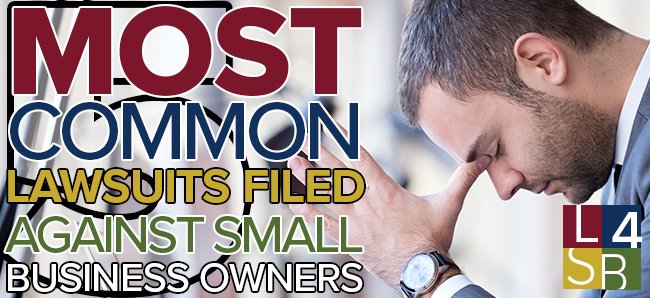Is your business doing all it can to avoid these types of lawsuits?
I recently did some research into the most common lawsuits that are filed against small business owners. What I see coming across my desk here at the L4SB office matches what is happening across the country. Article after article, case after case delivered the same verdict; all small business owners are struggling in the same areas.
I am going to expand on these top lawsuits that are filed against small business owners over a series of blogs, but for today, I want to focus on the most overwhelmingly popular category: Human Resources. Of the top 5 categories of lawsuits filed against small business owners, 1 – 3 are Human Resource related issues.
Top 5 Categories for Lawsuits Filed Against Small Businesses and Their Owners
1) Employment Discrimination/Wrongful Termination Lawsuits
- Title VII of the Civil Rights Act
- Pregnancy Discrimination
- Equal Pay
- Age Discrimination
This category of lawsuits is hands down, the most common. Accusations of discrimination by employees often comes down to the mishandling/mismanagement of employees and the associated labor laws. Small business owners do not always understand that some of their managerial and administrative practices can result in discrimination, especially when it was not the business owner’s intent to discriminate in the first place.
2) Discrimination suits not based on employees: Vendors, suppliers, patients, etc…
This category refers to how the business- not just the owner, but the employees as well interact with others outside of the business. Did you realize your business may be held accountable for the actions of your employees?
3) Wage Law Violation Lawsuits
This category is self-explanatory. Wage Law violations are claims that the business has paid employees incorrectly. Often, it is an honest mistake on the part of a business owner. However, an honest mistake doesn’t lessen the obligation of the business owner has to ensure they are up to date on all employment law, especially laws the pertain to wages, overtime and time off. Employers must pay employees correctly.
4) Torts
Most torts are covered by a business’s general liability insurance. Examples of torts would be a person slipping and falling in your office or property damage that occurred in the process of your employees doing a job. (Painters spilling paint on a carpet, for instance.)
5) Breach of Contract Lawsuits
The category of breach of contract speaks directly to the work or service your business performed for a client.
Related Articles:

Let’s focus on 1 through 3
The problem with Human Resources and Small Businesses:
The reason small business owners are particularly vulnerable to such HR related lawsuits are that small businesses are less likely to have an HR professional on staff to consult with. Human Resource Advisors are the front-line defense for avoiding discriminatory practices, acting overly emotional when reprimanding or firing an employee, keeping the business compliant with federal employment laws and ensuring proper hiring guidelines are followed.
Lawsuits that are filed regarding discrimination and other violations to federal employment laws are serious business. They are often tied to substantial fines. They are also incredibly embarrassing to a business’s reputation and very expensive to defend should you need to hire an attorney.
Admittedly, when first starting my own company I counted on office managers and bookkeepers to take care of HR related paperwork. The truth of the matter is these employees were not qualified to do so. In many instances, HR related tasks were done incorrectly. It wasn’t until after I hired a Human Resources Advisor did I realize how complicated the Human Resources job was and learned that “good intentions” are not a defense against Labor Law violations.
Let’s put your current HR polices and programs to a test.
Here are some top Human Resource related statements that every business owner should be able to answer to the affirmative with complete confidence:
- I know the essential elements that should be in each of my employees’ files.
- I know the correct way to fill out an I9 and am ready for a potential audit from the government.
- I preform regular pay audits.
- I have a company employee policy manual that I am 100% confident is up to date with all employment laws and regulations.
- I have reviewed the policy manual with all my employees, and they have acknowledged receiving it.
- I know exactly what to do if someone files an EEOC complaint against my business.
- I understand the Family Medical Leave Act and can convey information regarding medical leave to my employees with 100% confidence.
- I fully understand the Americans with Disabilities Act and can effectively evaluate, recommend and carry out accommodations for my employees who need them.
- I know exactly how to handle terminating a problem employee and when I am obligated to issue them their final pay check.
If you are like most American small business owners, many of these questions caused you to pause. While taking on another employee doesn’t make sense for most small businesses, seeking out and consulting with experts certainly does. Call us today if you are unsure about any of the above-mentioned topics.

Look for our next Blog installment on the remaining categories that small businesses are most often sued for- torts and breach of contract.
Law 4 Small Business, P.C. (L4SB). A little law now can save a lot later. A Slingshot company.

